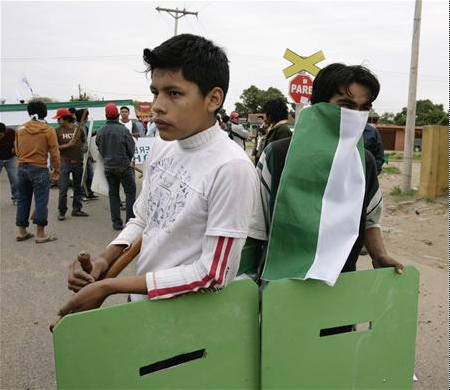
(above) Anti-government demonstrators stand guard at a blockade during a strike in Santa Cruz, August 19, 2008. Provinces of Santa Cruz, Beni, Pando, Tarija and Chuquisaca called for general strikes demanding autonomy from the central government of President Evo Morales and a greater cut of the country's booming energy revenues. Photo: REUTERS/David Mercado
Clashes erupt as Morales foes strike in Bolivia
August 19, 2008 - Reuters
By Eduardo Garcia
SANTA CRUZ, Bolivia (Reuters) - Hundreds of anti-government protesters battled supporters of President Evo Morales on Tuesday with rocks and sticks as a general strike against the Bolivian leader turned violent.
Police fired tear gas to disperse the crowd as the rival groups clashed in the eastern province of Santa Cruz, a bastion of opposition to the leftist president.
Governors in five of the country's nine provinces, including Santa Cruz, led the one-day strike to demand a bigger share of energy revenues and greater regional autonomy.
The protest came nine days after Morales won more than 67 percent of votes to survive a recall referendum. The vote, however, also confirmed his main right-wing rivals in office, deepening a power struggle that has raged all year.
Santa Cruz is home to civic and business leaders who fiercely oppose Morales' proposed leftist reforms of redistributing land to the poor and overhauling the constitution to favour the country's indigenous majority.
Anti-government demonstrators carrying baseball bats and shields fought with Morales' backers in a poor neighbourhood that is a stronghold of support for the Bolivian leader.
The opposition also staged strikes in Beni, Pando, Tarija and Chuquisaca provinces, and local media reported greater participation in urban areas.
Provincial governors from those areas want Morales to stop taking energy revenue previously earmarked for the provinces to fund a national pension plan.
But Morales says the provinces can afford to help with anti-poverty programs because their coffers swelled after he hiked taxes on energy companies in 2006.
"Our regions need to recover these resources," protest leader Branko Marinkovic told reporters in Santa Cruz before calling Morales "a dictator."
After a recent, failed meeting with the opposition governors, Morales charged they "only want money," while his foes accused him of trying to strangle them financially.
The impoverished country's first indigenous president, Morales draws most of his support from Aymara and Quechua Indians living in the western Andean highlands.
But his political rivals in the wealthier eastern regions, home to the country's vast natural gas reserves and rich farmland, oppose his policies and fear his ultimate goal is to turn Bolivia into a Cuban-style socialist state.
Javier Moreno, a 30-year-old protester who blocked streets in Santa Cruz with a dozen other men, accused Morales of inflaming political tensions in the country.
"He's provoked this power struggle with the provinces," he said. "There's one part of Bolivia that just lives off the country's natural resources and doesn't want to work."
Morales belongs to a group of leftist leaders in Latin America that has boosted state control over natural resources, among them Venezuelan President Hugo Chavez.
Morales nationalized the energy sector, raised taxes on foreign companies, and took over mining and telecommunications ventures previously run by large multinationals.
Graffiti seen on the streets of Santa Cruz called Morales a "fascist," "the Antichrist" and a "minion" of Venezuela's Chavez.
But many people in the striking regions support Morales. In the recall referendum, he won over 50 percent of votes in Pando and Chuquisaca, while in the other three provinces -- Santa Cruz, Tarija and Beni -- he got over 40 percent, thanks to strong support in rural areas.
(Editing by Kevin Gray)